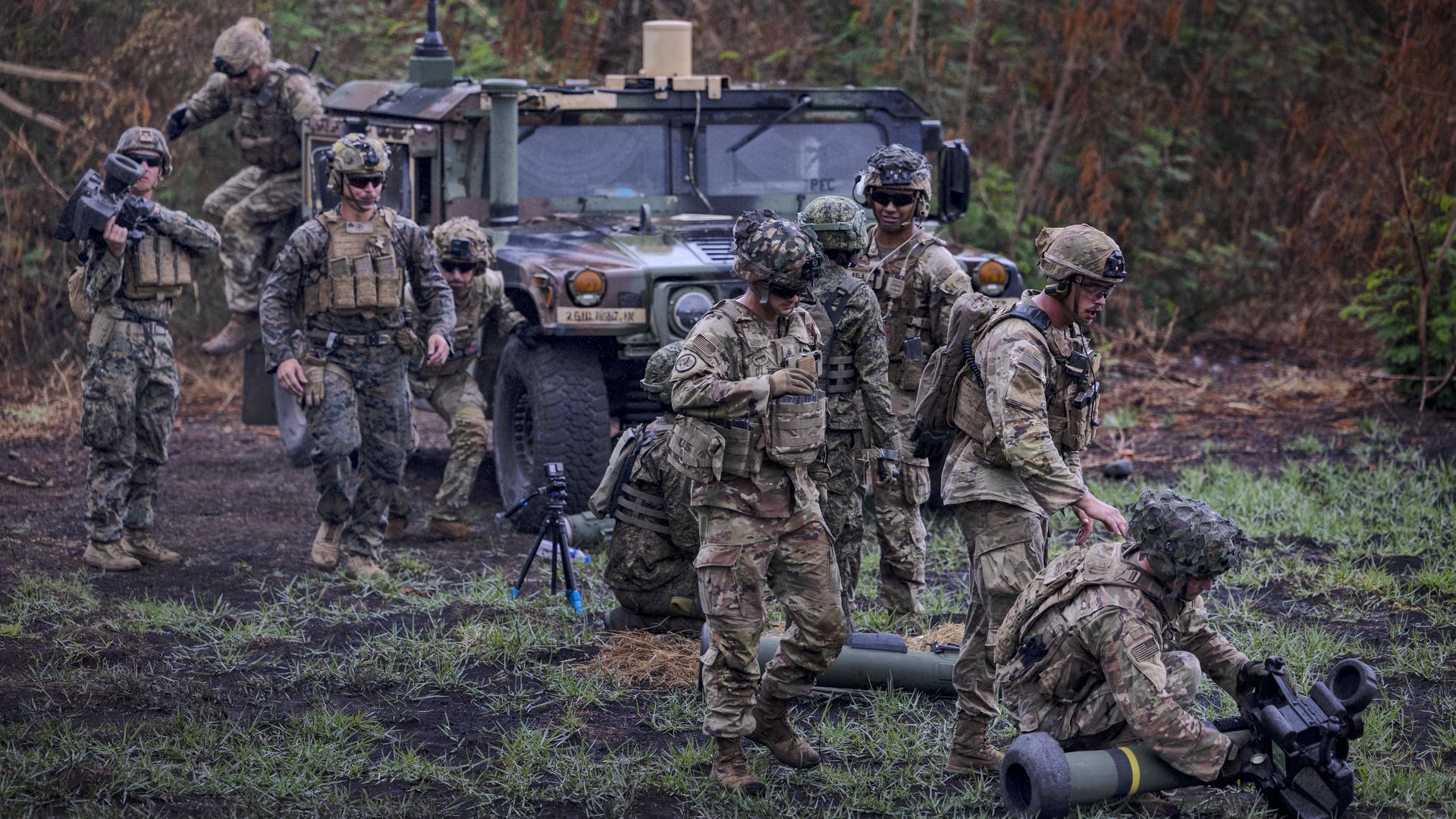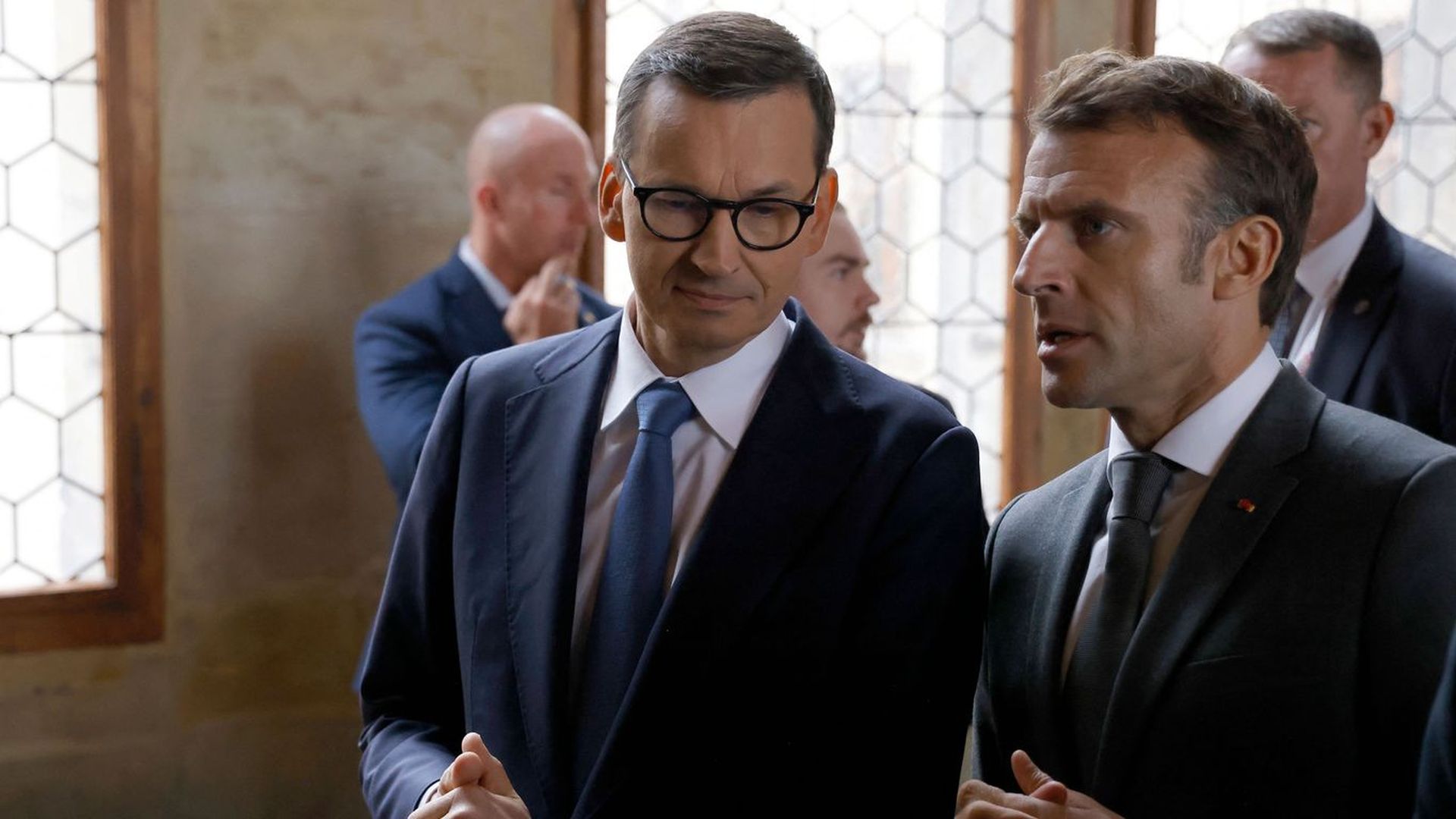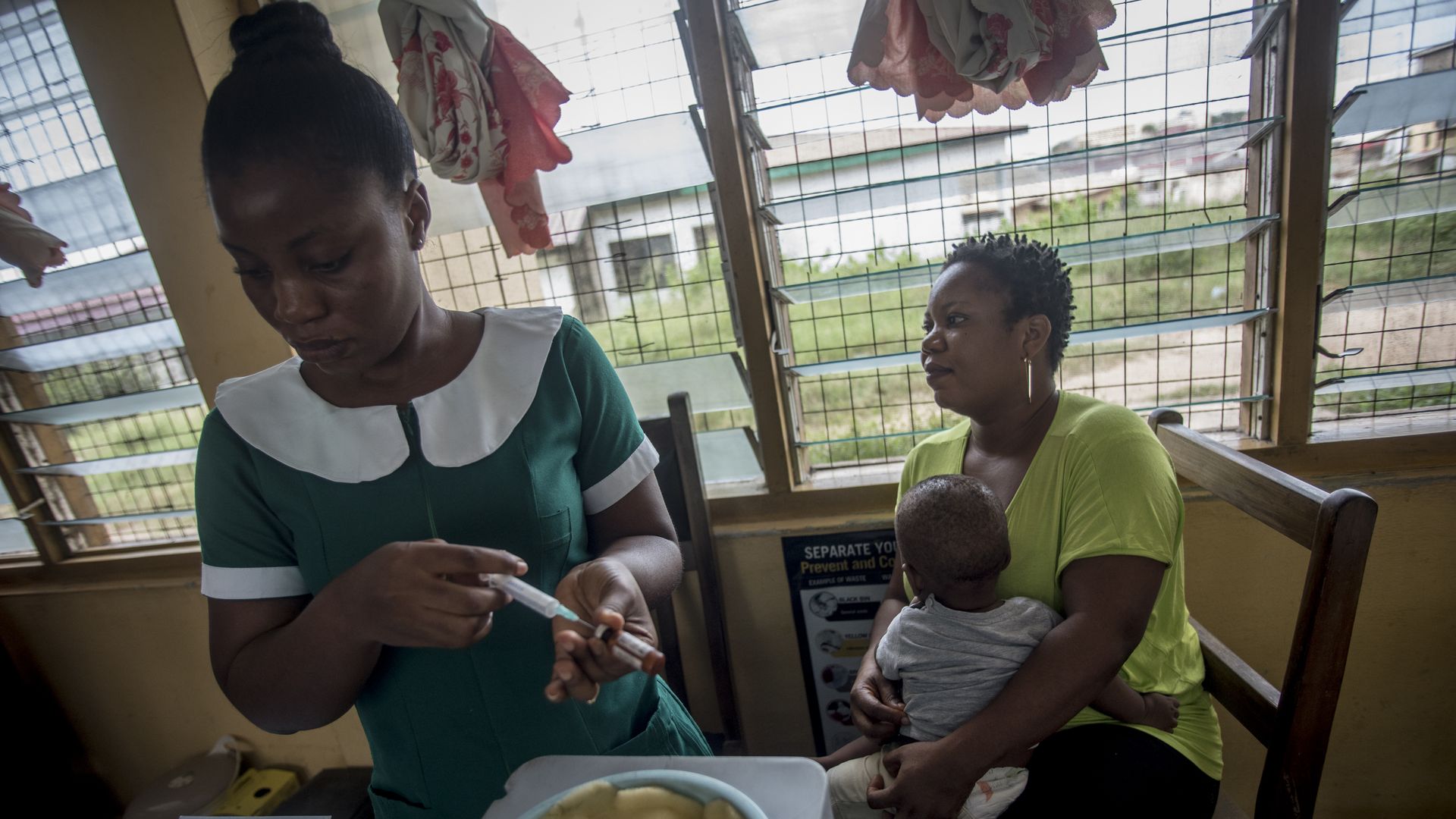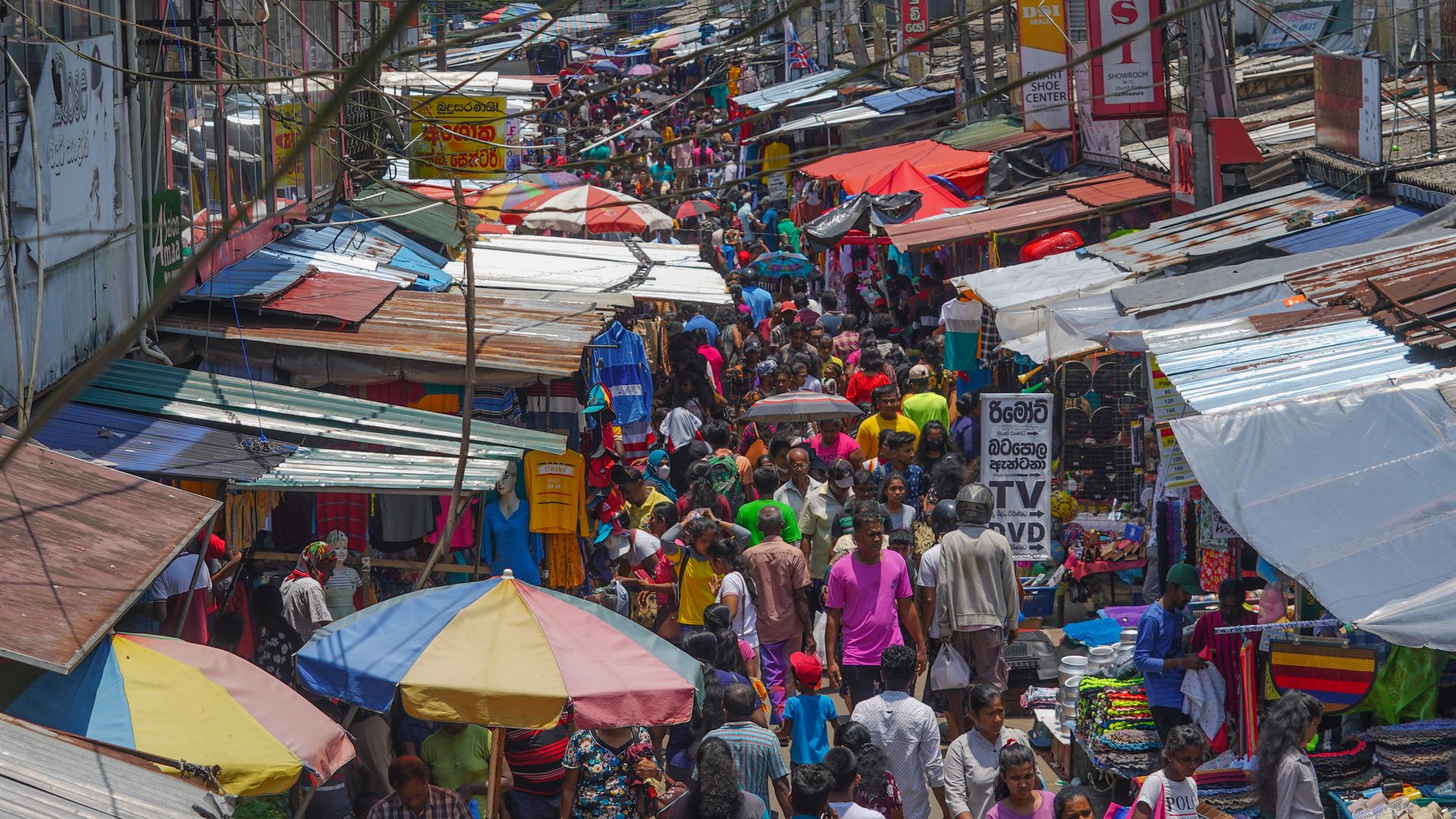| |
| |
| |
| |
| |
| Axios World |
| By Dave Lawler · Apr 13, 2023 |
| Welcome back to Axios World. - Tonight's edition (1,722 words, 6½ minutes) starts with a deadly scourge here in the U.S., and ends with hopeful news from Ghana.
New arrival? Subscribe |
| |
| |
| 1 big thing: U.S., Mexico, China trade accusations on fentanyl crisis |
 |
|
| A casket draped with an American flag and banners with the faces of people who died from fentanyl during a "Lost Voices" event in Washington, DC. Photo: Eric Lee/Washington Post via Getty Images |
| |
| As alarm over the fentanyl epidemic grows in the U.S., Republicans including Donald Trump are proposing military strikes against Mexican cartels, the Biden administration is urging Mexico and China to clamp down, and the leaders of those countries are making clear they see this as an entirely American problem. Why it matters: "Fentanyl is the single deadliest drug threat our nation has ever encountered," U.S. Drug Enforcement Agency (DEA) administrator Anne Milgram testified during a Senate hearing in February. - Synthetic opioids like fentanyl can be 100 times more potent than morphine and 50 times more powerful than heroin. They're also relatively cheap to produce — ideal for traffickers but dangerous for users, who often don't realize the drug they're taking has been laced with fentanyl.
- In 2021, the last full year for which data is available, an estimated 70,000 Americans died of overdoses involving synthetic opioids.
- The "only limit" on production is the availability of precursor chemicals, according to Milgram.
The big picture: U.S. officials say those precursors come almost entirely from China. "Criminal elements" in China ship the chemicals to Mexico, where most production takes place, according to White House drug control policy chief Rahul Gupta. - The DEA says the "vast majority" of the fentanyl that crosses the border is smuggled by the powerful Jalisco and Sinaloa cartels.
- Some Republicans are demanding that Biden designate the cartels as terrorist groups to open up additional criminal charges and potentially enable cross-border military action against them.
- As the 2024 presidential election cycle heats up, the inter-party and international accusations around fentanyl likely will as well.
Driving the news: Mexican President Andrés Manuel López Obrador has denounced the "threats to our sovereignty," argued that a "lack of hugs" and the "disintegration of families" are driving America's opioid epidemic, and claimed Mexicans neither produce nor use the drug, despite considerable evidence to the contrary. - But he also sent members of his security cabinet to Washington this week to discuss the issue, and sent a letter to Chinese President Xi Jinping last week asking for help "controlling the shipments of fentanyl."
- In response, Chinese Foreign Ministry spokesperson Mao Ning denied any Chinese role in fentanyl trafficking through Mexico and said the problem was "completely made in the U.S," adding: "The U.S. should face up to its own problems and take more substantive measures to strengthen domestic supervision and reduce demand."
State of play: U.S.-Mexico cooperation on drug trafficking has "collapsed" under López Obrador, while U.S.-China cooperation has "come to almost a complete halt," says Vanda Felbab-Brown of the Brookings Institution. - Fentanyl production largely shifted from China to Mexico as Beijing cracked down on shipments of the drug and some precursor chemicals starting in 2018. Relations have deteriorated since, and Beijing formally severed coordination on counter-narcotics after Nancy Pelosi's visit to Taiwan last year.
- Beijing claims it can't stop the export of precursors that aren't themselves illegal, but Felbab-Brown argues the government could track shipments much more closely if it chose to, considering some Chinese companies are clearly marketing their products to the cartels.
- The Biden administration says it's not considering military action in Mexico. Strikes would be impractical given how widely dispersed production is, argues Kimberly Breier of the Center for Strategic and International Studies, but closer U.S.-Mexico security cooperation could make it more difficult for the cartels to operate.
The bottom line: Neither Mexico nor China appears likely to fundamentally change its approach any time soon, and leaders in both countries have a point when they note that the real driver of the crisis is demand in the U.S. - U.S. Rep. David Trone (D-Md.), co-chair of a bipartisan commission on fentanyl trafficking, told NPR that more education, treatment and prevention at home are "the only chance we've got."
|
    |
| |
| |
| 2. Lula to pitch Xi on "peace club" to end Ukraine war |
 |
|
| Maira Erlich/Bloomberg via Getty Images |
| |
| Brazilian President Luiz Inácio Lula da Silva is visiting China and will meet Friday with President Xi Jinping on Friday. Why it matters: Lula is seeking to elevate Brazil's role in international diplomacy after a period of relative isolation under his nationalist predecessor, Jair Bolsonaro. He's expected to raise with Xi his idea for a "peace club" of countries including Brazil and China to help mediate between Ukraine and Russia. - Last week, Lula dispatched his top foreign policy adviser to Moscow to discuss that proposal. Brazil's role in Ukraine diplomacy up to now has been minimal, and it's unclear whether Lula's proposal will gain traction.
- The peace club idea is unlikely to be particularly popular in the Biden administration, which has criticized Xi's own peace plan on the grounds that a cease-fire would only lock in Russia's territorial gains.
- Lula, meanwhile, has criticized countries for sending arms instead of seeking peace. While Lula has said it was a "mistake" for Russia to invade, he has also seemed to place some of the blame on NATO.
Between the lines: Lula, a veteran leftist, has made foreign policy a priority early in his tenure, advocating for regional integration in South America and international cooperation on issues like climate, and re-positioning Brazil as a nonaligned global power. He visited the White House in February, one month after taking office. - Brazilian Foreign Minister Mauro Vieira told Americas Quarterly that Lula's Brazil has "excellent relations" with the U.S. and "important relations" with China, but no "automatic alignment" with either power.
State of play: Trade and investment will also be major focuses of Lula's trip, which was delayed from last month after he came down with pneumonia. Lula is bringing a huge delegation of business leaders, and the two countries are expected to sign around two dozen deals. |
    |
| |
| |
| 3. Global news roundup |
 |
|
| U.S. and Philippine troops today during a joint anti-tank drill. Photo: Ezra Acayan/Getty Images |
| |
| 1. Federal authorities today arrested a 21-year-old Air National Guardsman in connection with the Pentagon leaks scandal. - Jaw-dropping reports from The Washington Post and The New York Times detailed the suspected leaker's posting of sensitive intelligence on U.S. allies and adversaries on a chat platform popular with gamers.
2. There's growing optimism that the Iranian-backed Houthi rebels and the Saudi-backed Yemeni government are inching closer to a truce and establishing a road map to end the yearslong war, Axios' Barak Ravid reports. - Meanwhile, Saudi Arabia and Iran are moving to quickly reopen embassies on one another's soil after China mediated a normalization agreement between them.
- At the same time, senior U.S. officials arrived in Saudi Arabia today in a sign relations between Washington and Riyadh are improving.
3. The U.S. and the Philippines began their largest-ever joint military exercises on Tuesday, Axios' Rebecca Falconer writes, a day after China concluded its own exercises around Taiwan. - Philippines President Bongbong Marcos has strengthened ties with Washington since taking office last June and vowed to defend his country's claims in the South China Sea — all while trying to maintain cordial relations with Beijing.
4. Kenya's government has delayed payment of civil service salaries as part of its efforts to avoid default. 5. Chile's congress passed a law to reduce the work week to 40 hours from 45, over five years. Latin America has some of the longest official work weeks in the world. |
    |
| |
| |
| A message from Axios |
| Smart, brief writing will transform your workplace comms |
| |
 |
| |
| Join Axios HQ on April 18 to learn more about Smart Brevity® — a formula for clearer, more effective essential workplace communications. You'll learn: - The research behind Smart Brevity.
- How to apply the formula.
- How Axios HQ — an AI-powered platform — helps bring it to life.
Register here. |
| |
| |
| Bonus: Where in the World? |
| Hope you're not getting tired of flags! - The rules are the same: Identify the nine countries represented above. It will be much easier if you spot the pattern.
Scroll to the bottom for answers. |
    |
| |
| |
| 4. Poland PM questions commitment of France and Germany on Ukraine |
 |
|
| Polish Prime Minister Mateusz Morawiecki (left) and French President Emmanuel Macron during a European leaders' summit in Prague last year. Photo: Ludovic Marin/AFP via Getty Images |
| |
| Polish Prime Minister Mateusz Morawiecki criticized some of his NATO and EU allies during an appearance in Washington today for offering insufficient support to Ukraine and cozying up to Beijing. Why it matters: While several European leaders have sought to downplay any divisions over those two key issues — the path forward on Ukraine and relations with China — Morawiecki expressed deep reservations about the positions of certain "Western European countries." - "There are politicians in Western Europe who want a cease-fire in Ukraine at any price, as quickly as possible," Morawiecki said.
- The Polish prime minister claimed some of the same countries that had grown deeply reliant on Russian energy were now "short-sightedly" preparing to become "more dependent" on China economically.
- Asked specifically about France and Germany by Axios, Morawiecki cast doubts on the commitment of both European powers to ensure a Ukrainian "victory."
Between the lines: The primary divisions between NATO allies on Ukraine have been over which weapons to provide, and whether Kyiv should be encouraged to soften its position on potential peace talks, with Central and Eastern European countries tending to be more hawkish. Go deeper |
    |
| |
| |
| 5. Data du jour: Americans think U.S. and China can't cooperate |
 Data: Pew; Chart: Axios Visuals Most Americans believe Washington and Beijing can't cooperate on issues like climate change and infectious diseases, while 83% view China negatively, according to a new survey from Pew. Why it matters: The Biden administration has tried to keep tensions over issues like Taiwan separate from dialogue in key areas, particularly climate. That has proven increasingly difficult. Meanwhile, views of China among the American public are growing increasingly negative. - 38% of Americans view China as an enemy and 52% view it as a competitor, while just 6% view China as a partner. "Enemy" was the top choice among Republicans (53%), while Democrats (64%) tended to choose "competitor."
- Flashback: Americans' views of China were broadly favorable until 2011, when they started a slow decline that has accelerated since 2017, according to Pew's annual surveys. Even in 2018, just 47% viewed China unfavorably, making the 83% figure five years later all the more remarkable.
Go deeper |
    |
| |
| |
| 6. Hopeful news: Ghana approves malaria vaccine |
 |
|
| A nurse at the first clinic in Ghana to approve a previous malaria vaccine, Mosquirix, prepares to administer it in 2019. The vaccine approved today appears to be significantly more effective. Photo: Cristina Aldehuela/AFP via Getty Images |
| |
| Ghana today became the first country to approve a new malaria vaccine for children developed at Oxford that appears to be highly effective. - "It has been a massive, century-long, scientific undertaking to develop a vaccine that protects the body from the malaria parasite," the BBC notes.
|
    |
| |
| |
| 7. Stories we're watching |
 |
|
| Shoppers in Ratnapura, Sri Lanka, prepare for the Sinhalese and Tamil new years, which are celebrated with fireworks and sweets. Photo: Thilina Kaluthotage/NurPhoto via Getty Images |
| |
- World economy's "tricky" phase
- Why the U.S. can't build EVs without China
- Biden in Ireland
- Price cap on Russian oil seems to be working
- Breaking down North Korea's advancing cyber prowess
- Tensions boil between Israel and Jordan over Jerusalem
- The fight for food in Central America
Quoted: "I subscribe to every word that I have spoken and every word of which I have been accused by this court. I blame myself for only one thing: that over the years of my political activity I have not managed to convince enough of my compatriots and enough politicians in the democratic countries of the danger that the current regime in the Kremlin poses for Russia and for the world." — From Russian opposition politician Vladimir Kara-Murza's statement at the conclusion of his trial for treason |
    |
| |
| |
| A message from Axios |
| Smart, brief writing will transform your workplace comms |
| |
 |
| |
| Join Axios HQ on April 18 to learn more about Smart Brevity® — a formula for clearer, more effective essential workplace communications. You'll learn: - The research behind Smart Brevity.
- How to apply the formula.
- How Axios HQ — an AI-powered platform — helps bring it to life.
Register here. |
| |
| Answers: 1. Nigeria; 2. Norway; 3. North Macedonia; 4. Netherlands; 5. Nepal; 6. North Korea; 7. Namibia; 8. Nicaragua; 9. New Zealand |
 | | Are you a fan of this email format? Your essential communications — to staff, clients and other stakeholders — can have the same style. Axios HQ, a powerful platform, will help you do it. | | |
No comments:
Post a Comment